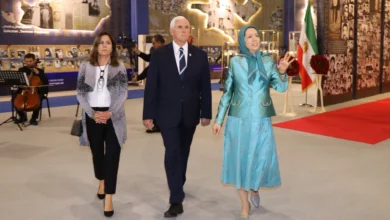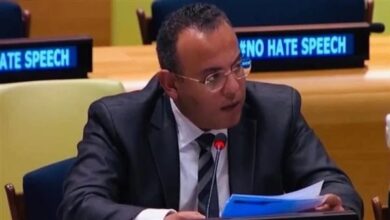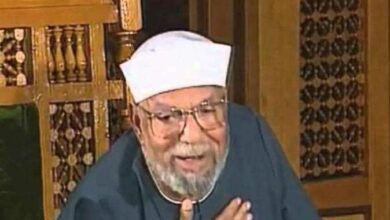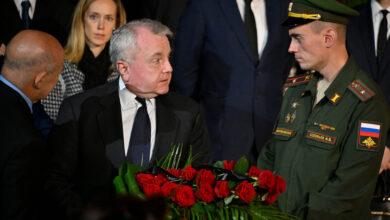Refaat el-Said, president of the Leftist opposition party Tagammu, spoke in an interview with Al-Masry Al-Youm about the upcoming elections, potential candidates ElBaradei and Amr Moussa, his own possible candidacy, constitutional change, and the Muslim Brotherhood.
Al-Masry Al-Youm: What do you think about the 2011 presidential elections?
Refaat el-Said: You are asking me about the unknown. It is premature to discuss the 2011 elections at this point. The parliamentary elections will take place before that date, and they will be manipulated to mobilize the public […] Of course everything is in the hands of the president of this country, but the parliamentary elections may still serve as an opportunity for the public to achieve real constitutional and legislative change.
I do not believe in conspiracy theories, but I fail to understand why everybody is talking about the presidential elections right now, and why there is pressure for people to chose from among candidates who have not even been chosen yet.
Al-Masry: Don’t you think it’s normal for people to be concerned now about who their next president will be?
El-Said: Of course it is, but we should be rational about it and not too emotional. We started to hear names like Amr Moussa, Mohamed ElBaradei and Ahmed Zewail nominated for the presidency. They are all respectable people, but now is not the time to start that battle.
Al-Masry: Some say those names were suggested because other political parties don’t have strong candidates who can compete with the candidates of the ruling National Democratic Party.
El-Said: Who said we don’t have strong candidates? We were asked to suggest certain names, but this is not the issue. More important is that we have a program for reform.
Al-Masry: Who asked you to suggest certain candidates?
El-Said: I would prefer not to answer this question.
Al-Masry: Do you mean leaders of the National Democratic Party?
El-Said: Yes, but we know that we do not stand a chance, because it won’t be a fair battle.
Al-Masry: According to Article 76 of the Constitution, your party is the only opposition party that has the right to nominate candidates for the next presidential elections without having to wait for the outcome of the parliamentary elections, because you have an elected member in the Shura Council whose term continues beyond 2011. So who would your party nominate?
El-Said: This doesn’t mean I would nominate myself. I need to study first if such a step would be at all feasible.
Al-Masry: Will you wait for the results of the parliamentary elections?
El-Said: Yes, because in this country we have a monopoly of power and contempt for the other. And the state-run media have spoiled matters for both the regime and all other political players.
Al-Masry: So what’s your plan for the presidential elections?
El-Said: It will be determined when the time comes.
Al-Masry: Are you telling me that a party like Tagammu cannot determine its position as regards the presidential elections a year and a half ahead? Why do you want the National Democratic Party to announce its position now?
El-Said: I did not ask the ruling party to announce its position now. Who knows who will still be alive by then?
Al-Masry: So your party has among its members candidates who could compete?
El-Said: But of course, at least 20 of them.
Al-Masry: Including you?
El-Said: I said before that I would be interested only if I would be playing a real role within a system of equality and transparency. And bear in mind, the ruling party has a lot of money. It can pay a private satellite channel to cover its campaign, whereas I cannot afford such a thing.
Al-Masry: Do you think it is possible for all opposition parties to agree on one candidate?
El-Said: Let them agree first if they will run in the elections in the first place.
Al-Masry: Does how the elections played out last time encourage opposition parties to run this time around?
Al-Said: Of course not. Last time was a farce.
Al-Masry: What do you say about the conditions that ElBaradei has demanded be in place if he is to run for the presidency?
El-Said: ElBaradei is a respectable man and he has succeeded in gaining the respect of Egyptians and the Arab world. There have been some reservations regarding his lenient position towards the Israeli nuclear file, which is normal when you work for an international organization. Of course he is entitled to nominate himself, but his vision is influenced by the general atmosphere in which he lived for too long, and by conditions that are unimaginable.
For example, he wants to enable all citizens to nominate themselves. This means we would end up with 45 million candidates to choose from. How would we do that? Egypt is not an Athenian democracy.
Then he says Egyptians must have a national project to aspire to. How can this be when the Muslim Brotherhood want a religious state, while the liberals want a secular state? We have no consensus over one national project.
Also he needs to join a political party first before he can run for the elections. Let him speak more and let us hear what he has to say about corruption, poverty and other important issues before we judge.
Al-Masry: And what about Amr Moussa?
El-Said: The same thing. I believe those names were mentioned to distract the public from demanding their fundamental needs for true constitutional and legislative change.
Al-Masry: Would the Tagamu party accept a candidate from outside of the party?
El-Said: We haven’t discussed that yet.
Al-Masry: Do you agree on the principle at least?
El-Said: It is not a matter of principle. I’m not going to buy myself a candidate from a supermarket. How can I appoint someone to the party leadership who was not elected in the first place? Our rules and regulations do not allow us to do so.
Al-Masry: What do you think of Heikal’s initiative?
El-Said: It’s undemocratic. He suggests appointing a board of trustees for Egypt that consists of certain prominent figures; something I fail to understand. What we have always been fighting for is a democratic way of choosing the president.
Al-Masry: He said that Egypt is on the verge of "black chaos." What do you think of that?
El-Said: We already live in chaos. As for the color black, I think this would be true if the Muslim Brotherhood ruled the country.
Al-Masry: What do you think of Article 77 of the Constitution?
El-Said: Since 1981 we have been calling for limiting the presidency to two terms only. This is what we do within our party. Twelve years for a president is more than enough.
Al-Masry: The National Democratic Party says one term is not enough to make constitutional amendments.
El-Said: They did not say that.
Al-Masry: They said it under the pretext of "political reconciliation"?
El-Said: Reconciliation with whom?
Al-Masry: What are Gamal Mubarak’s chances in the presidential elections?
El-Said: If the people want him, he will win. And if they want someone else, then someone else will win.
Al-Masry: Aren’t you against the nomination of Gamal Mubarak?
El-Said: Why should I be? I want free elections for everyone.
Al-Masry: Do you think the public is for or against the son of the president inheriting power?
El-Said: Inheritance of power is a violation of the constitution.
Al-Masry: Why didn’t you join the movement against power inheritance?
El-Said: A political party should not join a group of individuals.
Al-Masry: Was it because the Muslim Brotherhood joined that movement?
El-Said: That’s another story.
Al-Masry: What stance you think the Muslim Brotherhood will take in the next presidential elections?
El-Said: They are bargaining with the regime. The bargain already began with the regime releasing some of their arrested leaders. It will give them more freedoms and seats in parliament in return for their votes in the presidential elections.
Al-Masry: Rumor has it that the Tagammu and Wafd parties will also strike a deal with the regime in return for a few seats in parliament.
El-Said: I have nothing to give the regime.
Al-Masry: Last time you did not vote for President Mubarak.
El-Said: We never voted for him.
Al-Masry: Do you think Mubarak would run in the elections yet again?
El-Said: Most probably.
Al-Masry: Do you think there is a need for a vice-president?
El-Said: Not one year before the elections. It would be a fait accompli.
Al-Masry: Does Article 76 of the Constitution allow independent candidates to run in the presidential elections?
El-Said: No.
Al-Masry: Not even from the military?
El-Said: The military institution does not nominate candidates. It is the least corrupt institution of the government. We do not want it to engage in politics. Military rule is not good. We’ve tried it before.
Al-Masry: Will there be foreign interference in the selection of the president?
El-Said: No.
Al-Masry: What are Ayman Nour’s chances?
El-Said: He is not a popular man.
Translated from the Arabic Edition.




